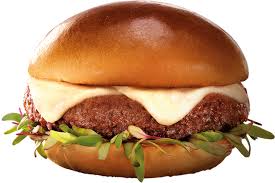Innovation lead for the world’s largest meat producer talks plant-based protein

The Good Food Conference 2019 is fast approaching! This year’s conference, set in the heart of San Francisco, will convene leaders from across the protein landscape—from startup founders to team members from some of the biggest food conglomerates in the world.
JBS global innovation lead Christy Lebor will be joining us to discuss why meat companies are diversifying into plant-based protein. Based in Brazil, JBS is the biggest meat producer in the world. With a new plant-based burger on the market, however, they are beginning to position themselves as a protein company.
Christy is responsible for creating revenue opportunities focused on the future of protein. She brings decades of brand management and innovation from her time at Kraft Heinz, PepsiCo, and Unilever. We caught up with her ahead of the conference to get a taste of how plant-based meat fits in with JBS’ market strategy, sustainability goals, and perspective on protein innovation.
How do you define innovation in the category of food?
At JBS, it is the global innovation team’s job to put the consumer first when it comes to innovation. We look for unmet consumer needs and figure out how a new type or format of protein could fill those needs.
Part of your job is increasing revenue in “the future of protein.” What is the future of protein at JBS?
The future of protein is the intersection of what consumers want and how the industry can execute on those needs. We use a combination of insight and foresight to create our consumer-driven innovation platforms. Our expertise and scale enable us to deliver the best products in the world. Plant-based protein is an area of interest for us as it fits this model perfectly: consumer need plus scale advantage equals a successful product.
With 16 years of experience in branding, have you ever marketed plant-based foods before?
Yes! I have absolutely worked on plant-based innovation before. This trend has been in the making for several years. I’d say plant-based opportunities have been a part of my work plan for the past five years.
How did JBS know that demand for plant-based products was increasing? What does consumer demand in Brazil look like?
Everyone can see the growth of plant-based consumption in the various data sets, including point-of-sale and consumer panel metrics. We can also see it in the media headlines. However, headlines alone can be misleading. So can short term trends in scanner data. There has to be a fundamental shift in consumer behavior at a mass level for a trend to be meaningful to us.
We know that about every decade, consumers change how they define “healthy.” We have been on the current definition of less processed foods for about a decade. Now the world is ready for the next wave of health and wellness. We have a point of view on what the next macro health trend is, and several attributes of plant-based protein fit well in that new space. Brazil is a great proof point as consumer demand for plant-based currently outstrips supply. This is why we accelerated the launch of the Seara Gourmet Incrivel Burger in the Brazilian market (a burger made from soy, beets, wheat, garlic, and onion).

How does plant-based meat figure into JBS’ sustainability goals (reducing emissions, electricity use, water intensity, etc.)?
Plant-based protein is an excellent complement to JBS’s sustainability goals. As the world’s largest protein company, we have to keep sustainability at the forefront of what we do. At JBS, sustainability involves improving the short and long-term performance of our business. We accomplish our goals by balancing and managing economic, societal, and environmental factors. What gets measured, gets done—which is why we track our progress on sustainability every year and publish a report for everyone to see.
What drew you to a career in the food and beverage industry?
Curiosity, and a love of culture. Plus, I’m a sucker for good marketing. I was that kid who sent away for those cereal box sweepstakes…every…time.
Register now for theGood Food Conference in San Francisco, September 4-6, where Christy will share more insights on plant-based innovation. Check out the full list of world-class speakers here.

